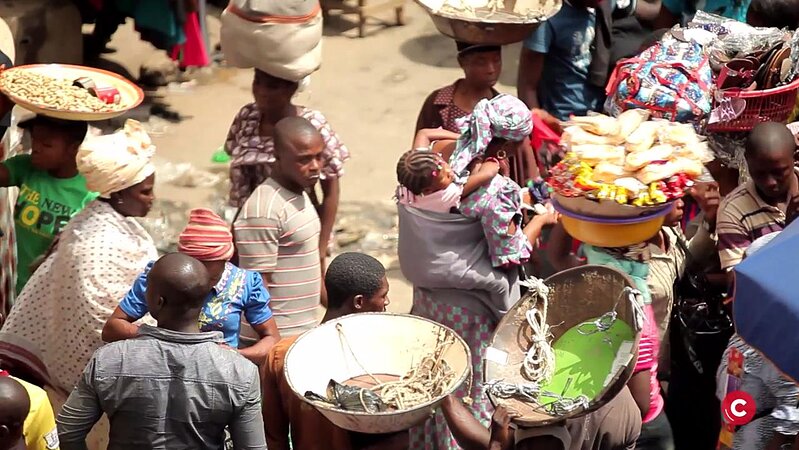Ayo Awosika is on her way to being one of music’s best new acts.
The Nigerian-American singer has toured with big acts like Coldplay, Miley Cyrus, and The Chainsmokers. She’s worked with Grammy-winning producer Scott Jacoby and appeared on stages around the world.

Now, Awosika is taking the world by storm with her latest pop hit, “You’re The One,” paying homage to her Nigerian roots.
ESSENCE spoke to the singer about the new single and how the country inspires her art.
Nigerian artists are experiencing a big moment in pop culture, which will hopefully continue, why do you think people are giving more attention to these artists?
There are so many incredible Nigerian artists that the world should know about. These artists have always been very talented and hard-working and they have garnered attention in Nigeria and across the continent for some time now. It only makes sense that their notoriety has expanded to western pop-culture.
Well known American artists like Drake have been collaborating and writing with some of these artists, (like Wizkid, for example) so we started seeing songs like “One Dance” pop up, where elements of afro-beat and dancehall are being introduced into what we know as American pop music. This set off a chain reaction where so much music that was being released had a more “afrobeat” feel (or at least the attempt to) so the spotlight has turned on these African artists as others are now not only noticing and appreciating them, but also looking to them as an example of what’s popular, relevant, and fresh. I don’t think the attention will go away. It’s very well deserved and I love seeing artists and friends I admire in the spotlight!
What do you think people get wrong about Nigerian/Nigerian-American artists?
As a Nigerian-American artist, people aren’t sure how to label my music. I’m often called an “alternative” artist in Nigeria (probably because I have a band, I play piano and guitar, and I have a more eclectic sound). Genre-labeling can be helpful for audiences to find music but it can also effect the creative process and thus de-value the art. I’m always going to make music I feel the most connected to and know that there will be people who appreciate it for what it is regardless of the genre. I love creating different types of music and seeing my music evolve, and I look forward to seeing where my music will take me in the future.
You pay homage to your Nigerian roots with “You’re The One,” what specifically about Nigeria inspires you as an artist?
I always knew something was missing in my life; there were so many un-answered questions growing up around my dad’s up-bringing and the culture that he brought to our family. I started to explore a relationship with my African ancestors in my own meditations during and after college. Soon I felt them calling me back to the continent, and in 2014 I visited Nigeria for the first time since I was a baby.
It was a completely life-changing experience for me. I found a palpable vibrancy within the land, the people, the culture, the music – I couldn’t help but feel creatively inspired. It’s also a place brimming with art and innovation. I witnessed such joy and high energy; people are highly spiritual, and take joy in everything they do.
I went back to where my dad grew up in Ondo, and saw the house where my grandparents lived and met family that I had only seen in photos my whole life. My family really banded behind me and helped me put together a show in a week’s time that was incredibly supported and well received. I left feeling like I had a new home and wanting to expose people to the beauty of that place. “You’re The One” is an overflow of joy and appreciation for Nigeria.
How has being a Nigerian-American artists influenced the kind of music you make?
I grew up listening to all kinds of music from Diana Ross and Pavarotti to Sade and Fela Kuti. I love that my parents had such an eclectic music collection because I now listen to and appreciate so many different kinds of music, and I think they played a big hand in that. That musical diversity has definitely filtered into my writing style and how I make stylistic choices. Growing up, I always sang in choirs and loved singing with other people. To this day, harmonizing with people is one of my most favorite things to do. In my recorded music, I’ve always sought to create a world for the listener, and in the live show, to really take the audience somewhere with me… to not just play a series of songs, but to draw them in song by song.
But I feel like my listening to African artists like Fela Kuti, Sade, King Sunny Ade and Salif Keita has contributed to my eclectic sound. I love mixing jazz, soul, r&b and pop elements into my music and have always kept my shows as live as possible with a band, background singers and sometimes horns. Currently in my writing, I’ve been wanting to bring in more traditionally African instrumentation: for example on “You’re The One” I worked with both a Nigerian producer (VStix) and American producer (Jeremy Lawrence) on this song – and we tracked real talking drums and had a great guitarist in Nigeria play on the track as well. It was important to me to have these elements be present and I feel like they really brought the song to life. I didn’t really speak Yoruba growing up, but have been learning now! So you hear that in the chorus as well. I’m just really excited to make more music like this, to hopefully collaborate with more Nigerian and African artists and to keep learning.







